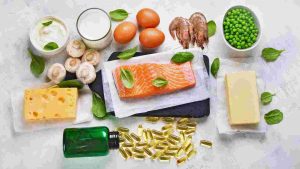Why Vitamin D Matters
Vitamin D, often referred to as the “sun vitamin,” is synthesized in the skin upon exposure to sunlight. However, many people, especially those living in regions with limited sunlight, are at risk of vitamin D deficiency. This can lead to issues such as weakened bones, increased susceptibility to illness, and fatigue. Fortunately, vitamin D can also be obtained from dietary sources and supplements, making it accessible to everyone.
Sources of Vitamin D
1. Sunlight
- Natural Synthesis: Exposure to sunlight is the most natural way to obtain vitamin D. Just 10-30 minutes of midday sun exposure several times per week can provide adequate vitamin D levels.
- Considerations: Factors like skin type, age, geographical location, and use of sunscreen can affect vitamin D synthesis. During winter or in northern latitudes, sunlight may not be sufficient.
2. Vitamin D-Rich Foods (Vegetarian and Vegan Options)
- Fatty Fish: Salmon, mackerel, and sardines are among the richest sources of vitamin D.
- Fortified Foods: Many dairy products like vitamin D milk, as well as orange juice and cereals, are fortified with vitamin D. Plant-based milk alternatives (almond, soy, oat milk) often have added vitamin D as well.
- Mushrooms: Certain mushrooms, like shiitake and maitake, are excellent vegan sources of vitamin D2 when exposed to sunlight.
3. Supplements
- Ergocalciferol (Vitamin D2) 50,000 IU: Prescribed for severe deficiencies, this high-dose vitamin D supplement is taken weekly or bi-weekly under medical supervision.
- Cholecalciferol (Vitamin D3): Widely available over-the-counter, this form is more effective at raising blood vitamin D levels. Injectable vitamin D is an option for those with absorption issues.
Recommended Vitamin D Supplements
Here is a table listing five well-known vitamin D supplement brands in the U.S., along with their highlights:
| Brand | Type | Form | Price Range | Highlights |
|---|---|---|---|---|
| Nature Made | D3 | Softgels, Tablets | $10 – $20 | USP verified, high absorption |
| Nordic Naturals | D3 | Liquid, Softgels | $20 – $35 | Sustainably sourced, non-GMO |
| Garden of Life | D3 Vegan | Tablets, Gummies | $15 – $30 | Organic, vegan-friendly |
| NOW Foods | D3 | Softgels | $8 – $15 | Affordable, highly rated |
| Thorne Research | D/K2 | Capsules | $25 – $45 | High-potency, combined with K2 for bone health |
Q&A: Common Questions About Vitamin D
Q: How much vitamin D do I need daily?
A: The recommended daily allowance (RDA) varies by age, gender, and life stage. For most adults, 600-800 IU is sufficient, but some may require more, especially those with limited sun exposure or dietary restrictions.
Q: Can I get too much vitamin D?
A: Yes, excessive vitamin D intake can lead to toxicity, causing symptoms like nausea, vomiting, and kidney damage. It’s important to adhere to recommended dosages and consult with a healthcare provider before starting high-dose supplements.
Q: Are there specific vitamin D needs during pregnancy?
A: Pregnant women need adequate vitamin D to support fetal bone development. The RDA is around 600 IU per day, though some experts recommend up to 4,000 IU daily in cases of deficiency.
Chart: Vitamin D Levels in Different Foods
These is a chart showing the vitamin D content in various foods, highlighting both vegetarian and non-vegetarian sources:
| Food Item | Vitamin D Content | Serving Size |
|---|---|---|
| Salmon (wild-caught) | 988 IU | 3.5 oz (100g) |
| Fortified Cow’s Milk | 120 IU | 1 cup |
| Egg Yolk | 37 IU | 1 large egg |
| Fortified Orange Juice | 137 IU | 1 cup |
| Maitake Mushrooms | 562 IU | 1 cup (chopped) |
| Fortified Soy Milk | 120 IU | 1 cup |
Real-Life Examples and Prices
- Ergocalciferol 50,000 IU: Typically prescribed for severe deficiencies, costs around $15-25 for a month’s supply.
- Vitamin D Milk: Fortified milk, widely available in grocery stores, costs about $3-4 per gallon.
- Injectable Vitamin D: Used for people with absorption issues, costs around $50-75 per injection.
Conclusion
Incorporating vitamin D into your lifestyle can significantly enhance your overall well-being. Whether through sunlight, fortified foods, or high-quality supplements, there are options for everyone, regardless of dietary preferences or health conditions. Remember to consult a healthcare provider to determine the best approach for your needs.








Recent Comments